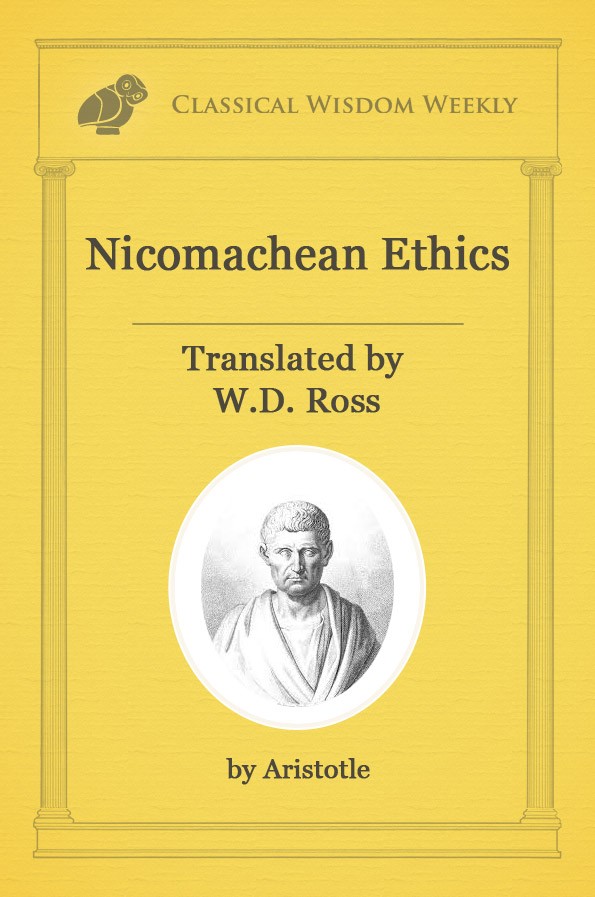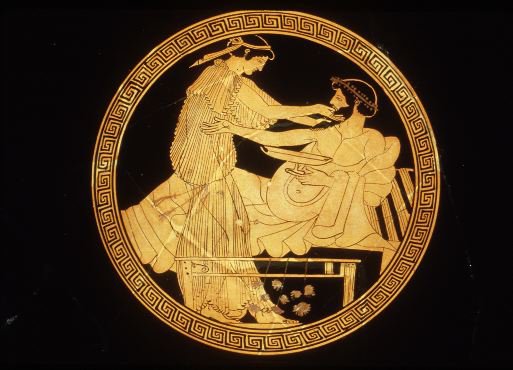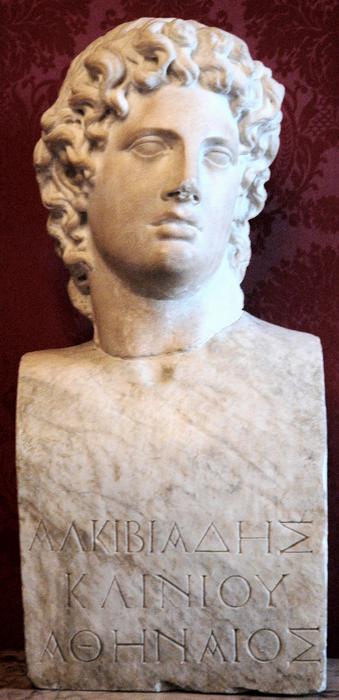By. Van Bryan
Socrates is often credited with the quote,
“By all means, marry. If you get a good wife, you will be happy. If you get a bad one, you will be a philosopher.”
“Behind every great ancient philosopher, there is a woman who hates his freaking guts.”
I think that’s how that one goes…
That isn’t to say that all writers wrote of Xanthippe as a shrew. Plato portrays her as a devoted wife and mother within the early pages of
the Phaedo. Still, the overwhelming consensus is that she was an argumentative, troublesome wife who was the source of many headaches for the philosopher. To be fair though, Socrates was most likely a difficult person to live with.
He certainly was a difficult person to have a conversation with. I imagine a conversation would go like this…
 Hey Socrates, nice day we have.
Hey Socrates, nice day we have.Is it? Perhaps since you are so knowledgeable and wise of all these things that are good, you would be able to tell me in satisfactory terms what it means to be “nice.”
Oh Zeus, help me. You keep this up and they will execute you one day.
Despite his tendency to turn any type of menial chit chat into a long philosophical discourse, there were a few other reasons why Socrates might have been a rather awful husband.
And I will say this as something of a disclaimer: When recounting Socrates’ life, we run into what is known as the Socratic problem. Basically, we can never be sure if the character of Socrates (Socrates within the pages of philosophical dialogues) bears any resemblance to the man himself.
We will have to take something of a leap of faith here. As one of our colleagues put it, “It may not be the best history, but it is history of a sort.”
1. Socrates wanted to argue

Sounds crazy right? That’s because it sort of is, at least by our modern standards.
Within Xenophon’s Symposium not to be confused with Plato’s, Socrates is asked why he puts up with his wife, a woman who is “the most shrewish.”
Socrates answers this rather plainly. He married Xanthippe precisely for her argumentative nature. His thinking was that if he could put up with her, manage her fiery temper, then he could easily converse with any other person in Athens.
Socrates gives the example of a horseman who wishes to become an expert. Rather than riding tame mules, the rider will choose some bucking bronco so that he might sharpen his skills and abilities.
Socrates says…
“I follow the example of the rider who wishes to become an expert horseman, none of your soft-mouthed, docile animals for me. The horse for me to own must show some spirit: in the belief, no doubt, if he can manage such an animal, it will be easy enough to deal with every other horse besides. And that is just my case. I wish to deal with human beings, to associate with man in general; hence my choice of wife. I know full well, if I can tolerate her spirit, I can with ease attach myself to every human being else.” -Xenophon (Symposium)
So Socrates did not marry his wife because he loved her, or because she was a devoted mother, or even because she was beautiful -you know, stupid reasons. He married her so that she might become a training partner for his philosophical excursions, albeit she was probably an unwilling one.
I imagine that when they got into arguments, Socrates probably spurred her on. She would probably mention how he spends too much time getting drunk at symposiums. Then he would say something passive aggressive about her mother. You know, normal stuff.
I’m no marriage counselor, but if you marry your wife for the sole purpose of arguing with her, don’t be surprised when she dumps a chamber pot over your head.
2. Socrates didn’t have a job
“And had I gained anything, or if my exhortations had been paid, there would have been some sense in that: but now, as you will perceive, not even the impudence of my accusers dares to say that I have ever exacted or sought pay of anyone; they have no witness of that. And I have a witness of the truth of what I say; my poverty is a sufficient witness.” -Plato (The Apology)
Now that is a rather noble sentiment. Socrates is a philosopher who is committed to his task and seeks no financial remuneration for his services. How wise of him.
Or is it?
If there are any people who didn’t think that this was wonderful, it was probably his wife and children. You remember them? They are those people who depend on Socrates to provide for them, to put food on the table. Well, don’t worry if you forgot about them. It’s possible that Socrates did too.
And before you decide to tell me that acquiring money would have destroyed Socrates’ philosophical virtue, I would remind you that there were plenty of other philosophers who would disagree.

Aristotle is one of them. Within the pages of his Nicomachean Ethics, Aristotle tells us how we should pursue wisdom and understanding for its own sake. The pursuit of knowledge will lead us to a happy life. That’s true.
Aristotle also tells us that having a roof over our heads and food on our tables is not something we can ignore. A man needs some money, philosopher or not. That isn’t to say that Socrates needed to completely sell out and try to become rich, but a little bit of income might have been nice.
Still, it is possible that Xanthippe did not need Socrates to bring home the falafel. It is believed that Xanthippe may have come from a wealthy, or at least moderately wealthy, family. We can make this assumption because her oldest son, Lamprocles, was named after his maternal grandfather.
This was a bit odd. Ancient tradition dictated that the first born son be named after his paternal grandfather. The only exception was if the maternal grandfather was wealthy or was held in high regard within the society. So Xanthippe’s father, who is believed to have been named Lamprocles, would have been more firmly established within Athenian society. His name would have been preferred.
If this is true, then it is possible that Socrates depended on his wife’s family money, Which doesn’t really help his case much. He begins to start looking like a dead beat husband, albeit a brilliant, philosophical one.
3. Socrates got drunk with his buddies

So Socrates has a nagging wife and he doesn’t have a job. What is the next step in this tired cliché? He goes drinking with his pals of course!
What a great excuse for drinking. Nowadays we study philosophy in the day and go drinking at night. Little do we know that they actually complement each other!
I wish I had thought of this as an excuse when I was in college. If my mother ever called me and asked if I was drinking, I could just tell her, “I’m working on philosophy!”
Okay, so Socrates is at these symposiums with all his friends. Where is Xanthippe? I assume she is home alone wondering when her drunk husband would stumble through the door. That’s one option.
I always liked to imagine that when Socrates was out, Xanthippe invited all the other philosophers’ wives over and they drank retsina and swapped gossip. That might not be historically accurate, but it makes me smile.
4. Socrates loved somebody else

Socrates married his wife because she had some spirit about her, not necessarily because he loved her. However, Socrates does admit to loving another person: a man, if you really must know.
“I perceive that you and I have a common feeling. For we are lovers both, and both of us have two loves apiece:—I am the lover of Alcibiades, the son of Cleinias, and of philosophy.” –Plato (Gorgias)
It is probably important that we point out that there is no evidence within this dialogue to suggest Socrates ever slept with Alcibiades. The younger man had hoped to sleep with Socrates so that the philosopher might impart some wisdom unto him. Socrates replied that he would be getting the short end of the bargain, trading philosophical wisdom for cheap thrills.
So Socrates may not have slept with Alcibiades, perhaps he is not an adulterer. Still, I can’t imagine that Xanthippe would have been very happy that her husband went around telling all of Athens that he loved somebody else. that sort of behavior just doesn’t promote a healthy marriage.
5. Socrates makes Xanthippe leave his execution
You probably already know how the story ends. Socrates does his thing for long enough, he upsets all the right people, and he is eventually sentenced to death for his crimes; surprisingly, being a shady husband was not one of them.
“O Socrates, this is the last time that either you will converse with your friends, or they with you.” -Plato (Phaedo)
At this point, I have to admire Xanthippe a bit. After all the lousy things that Socrates put her through, after all the misery and the headaches, he is still her husband and she is still his wife. It is rather touching actually. And it is nice to see that even if Socrates does not care about his mortal life, at least his wife does.
And how does he repay her for her loyalty? Doe Socrates consul her and tell her he loves her? Does he kiss his child and tell her that it will all be okay?
Nope. He sends her home without as much as a goodbye. Socrates instructs one of his friends to take Xanthippe home, rather curtly. She is escorted out, sobbing all the while.
Well, okay. Perhaps Socrates removed her from the dungeon so that she would not have to bear witness to her beloved husband’s execution. Maybe Socrates was trying to spare her the heartache. That would be nice, wouldn’t it?
It would be, if that had been why he removed his wife. The real reason he sends Xanthippe away is because his bros had arrived, and he needed to have one more philosophical discussion before he kicked the bucket. All those womanly emotions get in the way of philosophy, you know how it is.
Poor Xanthippe, she probably wasn’t the most agreeable person. But then again, she did have a rather difficult husband. If Socrates was a real person today, she would have divorced him long ago and taken full custody of the children. Try thinking of that next time you read philosophy.
 And we all (mostly men) get a good chuckle out of that. As a consequence of Socrates’ attitude towards his wife, Xanthippe is often remembered as a shrew, a scolding wife who was a pain in the rear end for philosophy’s most prestigious character. It was said that Xanthippe was so disagreeable that she once poured the contents of a chamber pot over the head of Socrates. This brings us to the other old expression…
And we all (mostly men) get a good chuckle out of that. As a consequence of Socrates’ attitude towards his wife, Xanthippe is often remembered as a shrew, a scolding wife who was a pain in the rear end for philosophy’s most prestigious character. It was said that Xanthippe was so disagreeable that she once poured the contents of a chamber pot over the head of Socrates. This brings us to the other old expression… Hey Socrates, nice day we have.
Hey Socrates, nice day we have. Sounds crazy right? That’s because it sort of is, at least by our modern standards.
Sounds crazy right? That’s because it sort of is, at least by our modern standards. While he regularly engaged in philosophical discussion, Socrates refused to accept any money for his services. This was done out of principle, because a pursuit of wisdom and truth are the only rewards a philosopher really needs. Socrates mentions again and again within Plato’s Apology that he has very little money.
While he regularly engaged in philosophical discussion, Socrates refused to accept any money for his services. This was done out of principle, because a pursuit of wisdom and truth are the only rewards a philosopher really needs. Socrates mentions again and again within Plato’s Apology that he has very little money. 
 So Socrates has a nagging wife and he doesn’t have a job. What is the next step in this tired cliché? He goes drinking with his pals of course!
So Socrates has a nagging wife and he doesn’t have a job. What is the next step in this tired cliché? He goes drinking with his pals of course! Socrates married his wife because she had some spirit about her, not necessarily because he loved her. However, Socrates does admit to loving another person: a man, if you really must know.
Socrates married his wife because she had some spirit about her, not necessarily because he loved her. However, Socrates does admit to loving another person: a man, if you really must know. At the outset of Plato’s Phaedo, Socrates is sitting in his prison awaiting his execution. He has just had his shackles removed and the guards are now beginning to mix the hemlock poison. As Socrates’ friends enter the cell, Xanthippe is sitting beside her husband, holding his youngest child in her arms. She is crying uncontrollably. Xanthippe says to her husband…
At the outset of Plato’s Phaedo, Socrates is sitting in his prison awaiting his execution. He has just had his shackles removed and the guards are now beginning to mix the hemlock poison. As Socrates’ friends enter the cell, Xanthippe is sitting beside her husband, holding his youngest child in her arms. She is crying uncontrollably. Xanthippe says to her husband…









24 comments
Actually Socrates had TWO wives, Myrto and Xanthippe.
Greeks could sort of marry a second or even a third woman, they just didn’t call it marriage. They called marriage only the first and there was some small difference in the ways of proposal and obtaining the second – but the legal status was the same (at least in Athenian law).
In Sparta, whose legendary lawmaker Lycurgus was very advanced, women were also allowed to have children with any of the Spartan citizens (the ‘equals’) they chose. So, Sparta has been the only Polity which managed to effectively render adultery obsolete ….by adopting very reasonable laws.
PS: Socrates had friends, who appreciated his presence in their lives very much, and some of them contributed to his family, taking care of their expenses. See? People weren’t stingy protestants back then…
As for his drinking, it was well known that he could drink more than anyone else in a symposium yet no one had ever seen him drunk. That’s manly control, not like you kids nowadays. :-p
While somewhat entertaining, this list is also a little frustrating. It is well known that Socrates did not write. All of the excerpts you select were actually written by Plato. There is zero evidence that Plato ever quoted Socrates — only that Plato used Socrates to be the mouthpiece to give HIS (Plato’s) philosophy credibility. It seems unfair to characterize Socrates in these ways, and perhaps is more fair to characterize PLATO in these ways.
I remember reading in ‘ribaldy of Greece’ which was reported a Love poem to Xanthippe by Plato. Not sure how true it was! But Could it be Plato putting words into Socrates mouth?
Socrates did not get drunk with his buddies: the Symposium is clear that whilst all the others were as the newt, Socrates was untouched by the sauce and just talked philosophy all night!
Socrates — ‘By all means marry; if you get a good wife, you’ll become happy; if you get a bad one, you’ll become a philosopher.’ Now I am a philosopher to the second degree {married Kali/Shiva’s dark of his two wives twice; – }
From personal experience, I found Socrates statement to be consistently compassionate as his philosophy.
His description of returning home and not knowing if she is greeting him with a stick at the door, is a classic metaphor of a borderline personality.
His wife attending him at execution is more likely motivated by her illness that includes ‘fear of abandonment’; while Socrates has learned from experience the classic “walking on eggshells” around a Borderline is not something one would want at the very personal experience of dying.
On choosing his wife, I can see his attraction to the challenge, but the reality of walking on eggshells would take reason of debate to irrational and personally painful levels. Often a Borderline, motivated by fear of abandonment, will engulf their partner to subordinate them like Cinderella so she cannot leave her sisters. I hate you, don’t leave me is a common mode of the borderline relationship.
For me, philosophy was born out of trying to make sense out of the irrational of ‘I hate you don’t leave me’. Similar to those victims of violence that obsess over violent media as if to find meaning in their irrational experience of violation, philosophy is to obsess over the irrational with rational insights.
Now I find that philosophy has become a protection from another relationship as most women do not engage philosophy; which helps me see the war between the sexes. Men as 75% narcissist and women as 75% borderline (check out on You Tube) and very puritanical.
When Men and Women honor each other’s gender, their relationship thrives in the very tantric as Socrates recognized in a good man (implied of his compassionate self) with a good wife will be very happy: – )
On behalf of Socrates, philosophy requires listening and connecting dots. In our current conservative puritanical society there is so much on the freedom of religion and the freedom of speech (preaching/evangelizing), that together they have demonized the Freedom to listen; which is the foundation of philosophy.
Another good reason: he was also an ugly, smelly, selfish slob who had little to do with his own sons upbringing.
What we’re apparently rying to do is create a reasonable narrative of a 2400 year old personal relationship using indirect and contradictory sources and entirely speculative characterizations. We’re adding verbatim quotations that just don’t survive that long a period of time,and then some of us seem to be trying to analyze 4th century Greek society through the lens of 21st century feminism. Fruitless?
Not a bit of it. “Five reasons why Socrates was a bad husband”? is pretty damned funny and just as likely historically as accurate as what anyone else on earth is ever likely to write about the two of these clowns. As my Scottish uncle George would say, “Ha!”
bad husband? what about his abusive wife? if Socrate was bad, his wife must have been the absolute worst
It seems fairly clear in Plato’s drama that Xanthippe returns to see Socrates after the conclusion of the philosophical conversation and before his execution (suicide):
“When he had washed, his children were brought to him—two of his sons were
small and one was older—and the women of his household came to him.
He spoke to them before Crito and gave them what instructions he wanted.
Then he sent the women and children away, and he himself joined us. *It
was now close to sunset, for he had stayed inside for some time.*” (Phaedo 116b; Grube trans.)
Your article’s tone sounds so sour…
Whiteknighting much? ;)
The relationship of Socrates and his wife in not unusual as the wives want husbands to be on their side majority of the times and men couldn’t at least in those times where men were supposedly the Earners, even though useless like Socrates in financial terms. If Socrates had friend both boy and girl then how can one deny that his wife may not be having one. If Socrates can do philosophy and extra relations simultaneously then why his wife may not have done rearing the children and rearing a relationship. The reason could be that the focus is Socrates and not Xanthippe.
We always give a benefit of doubt to women and not to men.
A lot of these comments are rather sexist. Women were only seriously allowed into acdemia in the last 100 years, while many countries still do not educate women. Most women are illiterate and not because they aren’t capable; They are restricted. That’s why women aren’t as “engaged in philosophy.”
From what we can gather, Socrates sounds like a husband absorbed with his work and uninterested in his family unless it furthered his agenda. Now, this is just based on what we know. It may not be true and it is a jusdement.
Terrible article, author sounds like a 14 year old girl who had just learned about feminism..
Crappy gossip mixed with false information while glorifying instant divorce, I salute not only Xanthippe for standing with her difficult husband, but all pre-21st century families who managed to keep their relationship standing despite differences. Hell, you probably can get divorced for adding extra salt in your partners soup, lol.
Well, for an humble, objective and deductive submission, I think Socrates got whatever it was that made him marry Xanthippe (Mostly argumentative nature) perhaps, He Socrates thought of his wife as a surrendering arguer, who might be useful to him as a person; what a miscalculation. Nonetheless, she was not dispose to this secondary reasons.
A mind like Socrates would never die a death given by others. Socrates was not passive persona. Hemlock is secretly induced into his body. He never gives wrong advice to his disciples to meakly surrender. History concocted. Lest he wouldn’t be a master to Aristotle’s Plato. To justify the end the means are literally manipulated. Something great secret was buried by the influential people of that time and later times. I believe it strongly. Get busy from this side. I have great many things to do. By the way do mail me if interested. This world needs a bigger shock for all its maladies, in everything everywhere
Lastly, Socrates was not a joker and we are not heroes and heroines
First of all, what kind of a person would think and talk about system in an unorthodox way. First condition he or she will be or would be critical, creative, constructive, reformative and/or rebellious. Such person is never timid and always foresighted. Wishes to continue the struggle or reform the establishment through his disciples, if he or she has any. This should be and could be Socrates, the harbinger of a thought process. That’s it folks. Keep this as a touchstone and re-read, research and re-write any history with fair honest and truthful mind for a colourful and beautiful world.
Philosophy is mind drenching. Philosophers are born in warring nations. Warring nations forcing men to become philosophers. If any country wants to yield philosophers it should go to war justifyingly or unjustifyingly. If war is justified then philanthropic philosophers are born and if war is not justified then Machiavelli is born -depending on the side of philosophy. Huff am exhausted. Sleep. Dreams
Sir I would like to know how my comments are. Could you please send me a feed back to my mail please. Waiting.
Thank you for this post! I’m a huge fan of Socrates and I’m glad to have read such a witty and well-written post. If you have time, please do check out my blog out too.
After reading the whole crap, I am just thinking. Wtf did I just read!
Well done and Bravo dear Van Bryan ! Being Greek I studied in school the philosophy of Plato and Aristotle with many details. And 6 years ago, I study another big part of greek philosophy that is hidden till our days. I have reasonable arguments against Socrates for many philosophical issues. As for his behavior to his wife, I found this to be realistic. I wonder, how some persons they do accept all the citation by Plato or Xenophon for Socrates as to be real. And when they read citations about the same Socrates how he lived in practice and in his real life, those same persons do not accept those citations and sources by Plato or Xenophon ?
With a little comment Rachana proved herself to be an impudent brat
I wonder and become pensive when a thought swept my mind. What would have been of the pioneer three philosophers in this present world amidst war mongering kims and super powers yearning for wars to earn money and geo-political domination? Or was it that, that their times needed them most? Were ancient Greek, Persia, Rome, Mesopotamia, Mayans ruled and witnessed more rude and raw periods of barbarism than today’s? Can anybody say and throw some light into this abyss?
Trackbacks
Our apologies, you must be logged in to post a comment.